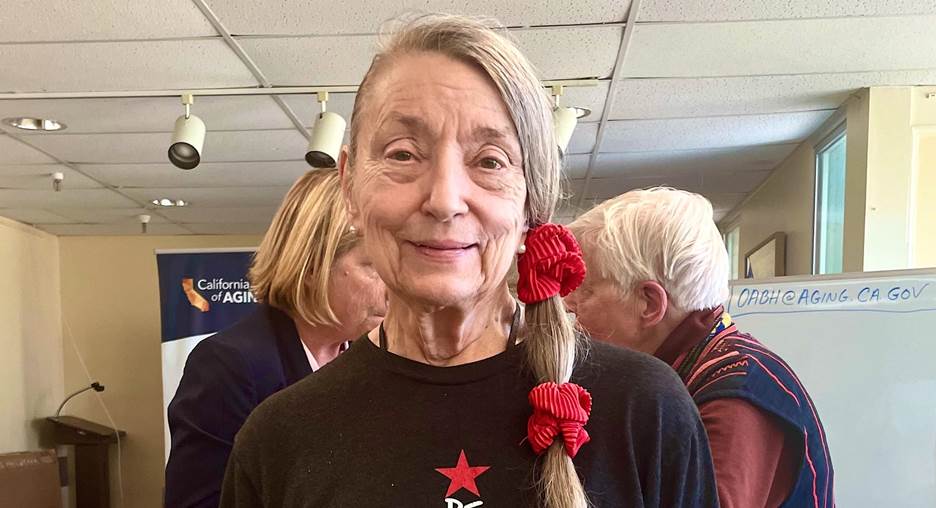
Fancher Larson, a patient advocate at the non-profit San Francisco Mental Health Clients’ Rights Advocates, at a recent community roundtable organized by the California Department of Aging. - Photo credit Selen Ozturk)
Making Mental Health an Integral Part of Primary Care for Older Adults
By Selen Ozturk
CA
With a quarter of Californians aged 65 or older by 2030, the state is looking for ways to better meet the mental and behavioral health needs of its older adult population.
San Francisco resident Fancher Larson has spent much of her career advocating for the rights of people with mental health challenges. An older adult, she was recently diagnosed with Alzheimer’s and now worries what will happen to a younger relative with behavioral health challenges for whom she is the primary care giver if she’s unable to care for him.
Larson’s story is among the array of mental and behavioral health challenges that older adults in California and across the country are facing in the wake of the COVID-19 pandemic.
“I’m not so worried about myself as about what will happen to my relative,” said Larson, a patient advocate at the non-profit San Francisco Mental Health Clients’ Rights Advocates. “Nobody should be shipped to a county facility and wind up being medicated because they don’t have help.”
Larson spoke during an April 27 roundtable discussion on the behavioral health needs of Bay Area older adults organized by the California Department of Aging (CDA).
Held at the On Lok 30th Street Senior Center in San Francisco, the event drew patients, clinicians, CDA staff, social workers and other community leaders who shared their experiences as more older adults contend with physical, mental and financial challenges even as pandemic restrictions recede.
The gathering is part of state-wide efforts to improve services for older adults under California’s Master Plan for Aging, a 10-year blueprint aimed at enhancing state- and local-level support in five key areas: housing, healthcare, social equity, caregivers, and financial security.
Fifteen percent of California residents are aged 65 or older. That number is expected to rise to 25% by 2030.
CDA Director Susan DeMarois said the goal of the roundtable – the first of four, with three more in Fresno, San Bernardino, and Ukiah – is to garner community input that can shape policy around meeting the behavioral health needs of older adults, who have seen a spike in physical and mental health problems since the start of the pandemic.
Experts attribute the trend in part to the increased social isolation resulting from pandemic-related restrictions and say that addressing that isolation by making mental health resources more available is key.
“Mental health is still a taboo in many communities of color,” said Michelle Fonseca, a resident of the city’s Mission neighborhood who is working to become a Licensed Clinical Social Worker.
“With all of the disinformation around COVID , many seniors didn’t want to be vaccinated,” Fonseca continued. “In my neighborhood, it was community members knocking on doors, speaking Spanish, Chinese, Tagalog, that gave these folks that sense of security to go and get the vaccine.”
“People are much more likely to overcome their fears if someone like them is sitting across the room or is on the other line,” said Dr Marcy Adelman, co-founder of the LGBTQ+ senior resource center Openhouse SF and a member of the California Commission on Aging.
Adelman, along with On Lok Chief Medical Officer Dr Ben Lui, both stressed that mental and behavioral health support needs to be better integrated into primary care services.
“Effective behavioral health services are those that are integrated into primary care,” said Lui. “For seniors with behavioral health conditions, there is often associated instability, and a good public health prevention model needs to address these problems upstream, like housing, financial planning, and transportation needs.”
Jim DeRoche, a senior citizen living in San Francisco, said trauma-informed training of care workers was key to connecting with older adults like himself. He also described his experience with the phone-based Friendship Line, operated by the Institute on Aging.
Seniors who used the Friendship Line “reported a marked decrease in depression, anxiety and loneliness over six months,” said Institute on Aging Vice President of Integrated Care Services Mia Grigg. “This trust-based emotional care is a part of primary care.”
Roundtable participants agreed that coordinating efforts to integrate behavioral health into primary care services needs to start at the state level.
“For many older adults with mental illness who then develop dementia, that new diagnosis means they’re no longer eligible for previously used mental health services,” said Jennifer Stephens-Pierre, the director of Alameda County’s Area Agency on Aging. “Without legislation to change this, they fall into a space where they want to underreport one illness over the other to keep getting the care they need.”
Mark Salazar, CEO of the Mental Health Association of San Francisco, said his agency has seen “significant drops in 30-day and six-month readmission rates” after integrating peer staff with Marin County behavioral health services through the San Francisco Department of Public Health and San Francisco General Hospital.
Other participants shared their own experiences of coordination among mental and behavioral health programs, imploring CDA leaders to reflect this at the state level.
“We’ve been able to serve seniors most effectively through Openhouse SF when we coordinate across programs — mental and behavioral health outreach with help for homeless seniors, or LGBTQ+ support services,” said Adelman.
But that city-level coordination is not enough, she added.
“I ask state leaders to invest in organizations that create the physical and legal infrastructure… to help seniors in their own communities.” Ethnic Media Services

